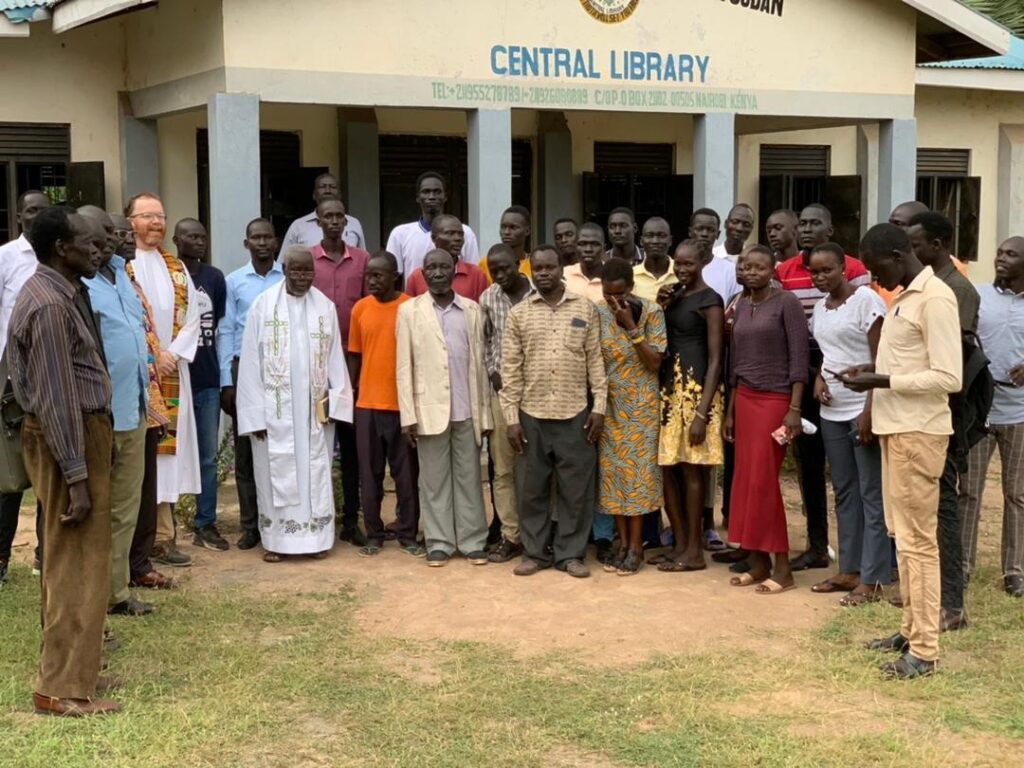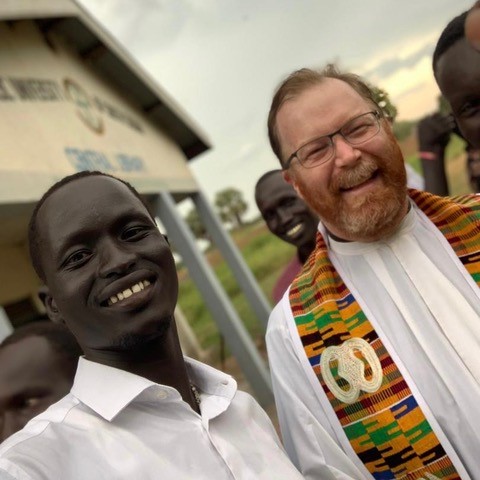It is an Irish truism that if you dig a good ditch, you don’t get time off, you get a bigger shovel. Apparently this is not just Irish wisdom, but South Sudanese as well. In addition to the work in Loreto College, I have been drafted by the Diocese of Rumbek to help run the local Catholic University. At this point of life you’d imagine I’d have learned to keep my head down.
It may sound a grand affair, but it is certainly a lot more simple than you’d imagine. We have a roof, but no ceiling; windows, but no glass; and floor with no tiles. The less said about the two pit toilets that serve the campus the better. Just today we had the cleaner in to take care of the bat infestation in the library, that also serves as the office. Having droppings continually fall on the desk during an academic meeting is distracting to say the least.

“Group photo from the My First Mass at the University showing the library with all the bats right behind!”
Initially I took on the role with the expectation that it would be a short term appointment. In fact, early on there was even a discussion around closing the University altogether. Still, it is one thing to consider in a meeting room, surrounded by pages of accounts, and entirely another to act out once you have met our students.
At the moment we have a sum total of 59 women and men studying either business administration or teaching with a focus on English literature.They are almost all from Rumbek, with only a couple from further afield. Some have come straight from school, while others are looking for new opportunities later in life. All are committed and enthusiastic about their third level studies. It is something to see really.
It takes a lot of energy to get worked up about a computer class, without computers, but with a drawing of a Windows home page on a blackboard.
This was one of the first classes I visited when I began. Since that experience of ‘theoretical computing’ we have been able to set up a relationship with a Jesuit community not so far away that runs a computer course – with actual computers!
We are also seeing an exciting new development. In traditional culture here, once a woman has her first baby she leaves formal education to focus full time on child rearing and subsistence farming. However, so far I have met a number of young mothers who are coming back to study, with their new born under their arm. It is unprecedented and we are looking at ways of supporting them and their young families. I mentioned the idea of a creche, but so far I’ve been met with looks of incomprehension. Honestly, if it wasn’t for the initiative of a particularly creative Donegal MSC setting up a parent and toddler group in one of my old parishes I wouldn’t have a clue either. We’re working on it. Watch this space.

“My first Mass at the University.”
For me the main reason the University is so important is that we are the newest country in the world and we really need to develop the local economy. It has to be stimulated by well trained, committed teachers and hardworking, innovative business people. Charity is excellent for crisis situations. It’s an act of solidarity and compassion for someone you will never meet, but who you are ready to call brother or sister. However, charity is not a long term strategy and instead we need to increasingly invest in people on the ground to effect their own change, not just raising up themselves and their families, but entire communities as well.
The motto our small University is, The Truth Shall Set You Free. Our faith underlies everything we do here. Religious sisters, brothers, and priests are among the best educated in the area and they are working as lecturers in ethics, management, business, and education. We have great local educationalists who are taking the lead too. I spoke with one them today, as we were cleaning up the last of the bat droppings from the top of my desk, that in five years we’ll look back and have a good laugh at everything we went through to become a real third level college. In the meantime there is a lot of work to do. I’d better get my shovel.
Bi Nhialic arrer kek yin,
Fr Alan
Read more from Fr Alan’s missionary journey in South Sudan:
- Looking for a Sign on the Way to South Sudan
- Building a Better Future in South Sudan
- Christmas Greetings from Fr Alan in South Sudan
- A Cup of Sugar and Maybe a Goat
- Mock Exams and Real Life in South Sudan
- As Easy as Baking a Cake
- Holy Week on the Move
- Three Arrivals and a Party
- Celebrating the Missionary Life
- Seeds of Hope
- Young People Fighting COVID-19 in Rumbek
- Ticket to Ride
- Lions, Snakes, and the World’s Deadliest Predator
- Vaccine Status: Denied
- Christmas in South Sudan